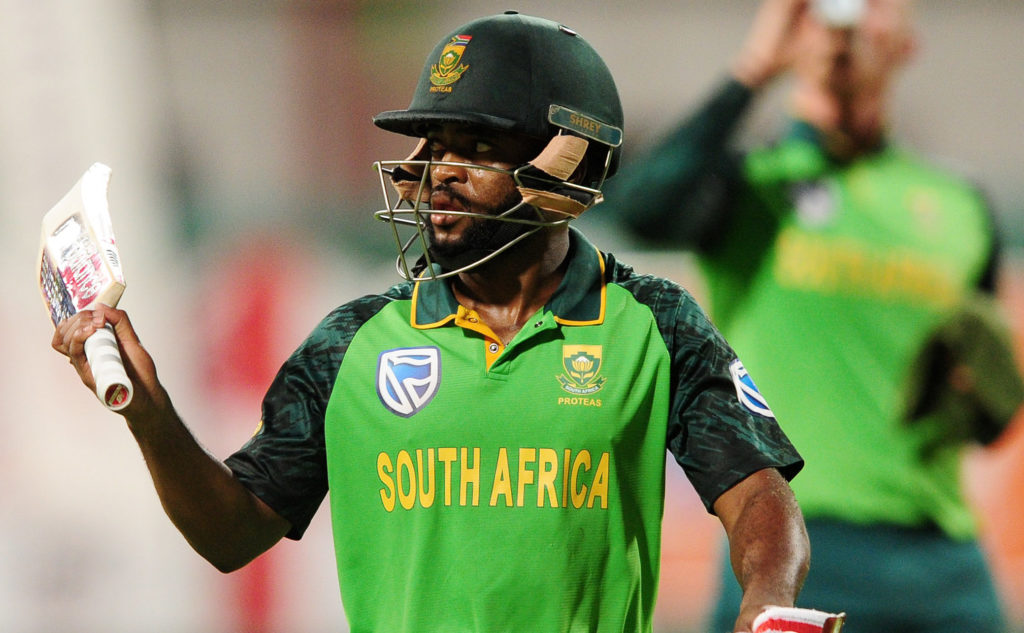Temba Bavuma’s important message off the field was as powerful as his strokes were on it this past Tuesday, writes CRAIG LEWIS.
What a joy it was to sit in the Railway Stand during the Proteas’ first ODI against England this week and watch tenacious Temba construct an almost picture-perfect 98 in a game-defining partnership with Quinton de Kock.
Understandably, De Kock’s century in a captain’s knock stole many of the headlines, but Bavuma won’t mind. He won’t mind at all.
It’s clear that he’s a clever cricketer, and also someone who is quite happy to fly under the radar, allowing his actions to do the talking.
When he fell just two runs short of what would have been a well-deserved century on Tuesday, you could almost feel the atmosphere deflate out of Newlands.
After all, for a good couple of glorious hours, thousands of fans had been entertained by Bavuma’s inventive, assured and almost faultless shot-making.
It was one of the finer knocks you are likely to see, and from a man – in just his third ODI – who has dealt with his fair share of doubters suggesting he is not equipped for the shorter format of the game.
After such a determined and defiant knock, you could sense that the crowd in Cape Town was itching for Bavuma to reach the three-figure mark so that they could applaud him with a deserved standing ovation.
Nevertheless, the Newlands crowd still rose as one to cheer him off the field for a superb 98. And yet, one almost wishes those thousands of fans could also have been welcomed into the press box to hear Bavuma’s post-match media interview. After all, some of his best work was still to come.
In an age where platitudes and cliches are most commonplace at the majority of sports media conferences, it’s not very often that you really get a sense of the person behind the steely sports star who takes the field.
During the Test series against England, Bavuma had already unwittingly been the ‘victim’ of many media column inches and even more blabber at the hands of keyboard warriors on social media.
The gutsy batsman was effectively ‘dropped’ from the Test team. Went away, scored a career-best 180 for the Lions, and was recalled for the final Test.
With Kagiso Rabada suspended for that match, and Lungi Ngidi injured, Bavuma was the only black African in the final XI for that last red-ball encounter of the series, and as is so often the case in South African sport, talk of transformation and representation figures were never far away.
These are important topics in our society, but so often emotion, misunderstanding and prejudice cloud those very conversations.
However, in the midst of it all, Bavuma parted those clouds with a series of rather poignant statements when discussing the challenges that come with being a player so often spoken about and judged within the context of the colour of his skin.
‘It has been hard, and I think it’s not so much the dropping part. All players get dropped and everyone goes through slumps of not scoring well,’ he honestly commented.
‘The awkwardness and uncomfortability from my side is when you’re thrown into talks of transformation and all of that. At the end of the day, yes, I’m black and that’s my skin, but I play cricket because I love it.
READ: ‘I’m black and that’s my skin, but I play because I love it’
‘I’d like to think that the reason I’m in the team is because of performances that I’ve put forward from a franchise side and for the national team. The discomfort was there, having to navigate myself around all those types of talks.’
At this point, you feel like Bavuma should have dropped the proverbial mic. From a person and player speaking from a place of true understanding of the challenges and complexities involved in this conversation, you cannot argue with a single word.
Yet, then came the kicker when Bavuma expertly touched on what the responsibility was like to be seen as a black batsman inspiring generations of young cricketers who view him as a beacon of hope and possibility.
‘That element is inspiring, when your fellow black African batsmen want to master the craft of batting … that’s something I try take in my stride.
‘The one thing that kind of eats me is that when you do well, transformation is not spoken about but when you do badly, transformation is thrown at the top of the agenda. I’ve got a serious problem with that.
‘You’ve got to be able to take the good with the bad. If transformation is bad when black African players are not doing well, then when they’re doing well let’s also recognise transformation for what it’s done.’
These are the words that every South African should read and hear. They should resonate with everyone, and are deserving of the standing ovation and rapturous applause that he received at Newlands on Tuesday.
Photo: Ryan Wilkisky/BackpagePix







